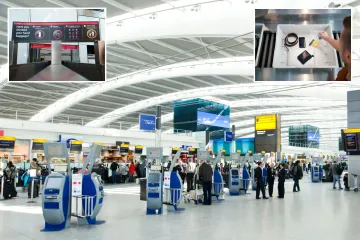Italian island introduces strict new bans after thousands of tourists flock to it
ONE beautiful Italian island known for incredible views and designer shops is cracking down on tourists.
It has implemented new rules in the hope of stopping large crowds from disturbing locals and other holidaymakers.
The pretty island of Capri, found in the Bay of Naples, is a beautiful spot that tourists flock to every year.
In the peak summer months of July and August there can be as many as 50,000 visitors each day.
In comparison, around 13,000 to 15,000 live on the island year round.
In an attempt to control and limit numbers, there are new tourism rules that will come into force this summer.
The first is to limit groups to 40 people in an attempt to control overcrowding.
Talking to The Times, Paolo Falco, the island’s mayor said: “They look like herds of sheep and it’s not nice to see. We need to save beauty; we don’t have any other choice.”
The rules also request that tour guides leading more than 20 tourists at a time use wireless earpieces rather than loudspeakers.
The guides have been asked to avoid using umbrellas to identify themselves and opt for identifiable clothing instead.
In an effort to not block the narrow streets, etiquette similar to travelling on the tube has been requested for large groups.
Paolo Falco added: “We’re saying to stay on the right on the way up, stand on the left on the way down and don’t loiter in the square.
“Sometimes they completely prevent locals from passing through.”
Other factors being considered to limit the number of tourists include controlling the boat traffic at Marina Grande port.
One long-standing rule for tourists and locals that was introduced in 2019 stopped people using single-use plastics.
The former Mayor of Capri, Gianni De Martino, approved the ban seven years ago – and anyone breaking the law could receive a €500 (£435) fine.
Capri is a short ferry ride away from Naples, usually taking around one hour making it a popular day trip destination.
The island draws tourists in thanks to its pretty natural surroundings like the Blue Grotto.
It’s a natural sea cave that glows a deep turquoise, often visited via small wooden boats.
During busy periods, sightseers can wait for up to two hours to get inside.
Other popular spots are the Faraglioni rock formations which visitors can see on the southern coast of Capri.
The central point of the island is the Piazzetta which is easily recognised thanks to its huge clock tower.
Surrounding it are lively cafés with outdoor seating and luxury boutiques.
Other highlights include the Gardens of Augustus, the Monte Solaro chairlift, and the ruins of Villa Jovis.
For more on Italy, here’s another Mediterranean island that Brits don’t know about with spectacular beaches – and it’s loved by Italians.
And check out this beautiful island which has 200 beaches.








